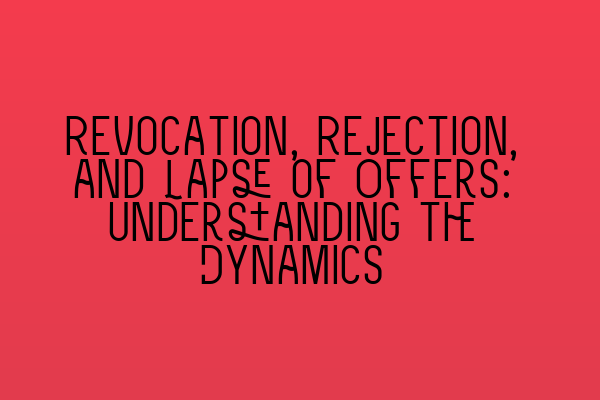Revocation, Rejection, and Lapse of Offers: Understanding the Dynamics
In contract law, offers play a critical role in the formation of legally binding agreements. However, the life of an offer is not indefinite. There are certain dynamics involved in the revocation, rejection, and lapse of offers that can impact the enforceability of a contract. As a solicitor, it is essential to have a clear understanding of these dynamics to provide accurate legal advice to clients.
Revocation of Offers
An offer can be revoked by the offeror at any time before it is accepted by the offeree. This means that the offeror is no longer bound by the terms of the offer and can withdraw it. However, there are certain requirements for a valid revocation:
- The revocation must be communicated to the offeree. It cannot be a mere intention or change of mind by the offeror.
- The communication of revocation must be received by the offeree before they have accepted the offer.
It is important to note that revocation is only effective when it is received by the offeree. If the offeree is unaware of the revocation and accepts the offer, a valid contract is formed.
Related Article: SQE 1 Practice Exam Questions
Rejection of Offers
An offer can also be rejected by the offeree. When the offeree refuses to accept the offer, it terminates the offer and the offeror is no longer bound by its terms. Similar to revocation, rejection must be communicated to the offeror to be valid. However, it is important to distinguish between a rejection and a counteroffer:
A counteroffer is a new proposal made by the offeree in response to the original offer. It operates as a rejection of the original offer and creates a new offer. The original offeror can accept, reject, or counter the counteroffer. If the offeror rejects or counteroffers the counteroffer, the offeree cannot later accept the original offer.
Related Article: SQE 1 Practice Mocks FLK1 FLK2
Lapse of Offers
An offer can also lapse due to the passage of time or the occurrence of an event specified in the offer. Here are three common scenarios that can result in the lapse of an offer:
- Expiration of Time: If the offer specifies a time limit for acceptance, the offer lapses automatically if the offeree does not accept within that time frame.
- Death or Incapacity: If either the offeror or the offeree dies or becomes incapacitated before the offer is accepted, the offer lapses. The estate or legal guardian of the deceased or incapacitated party cannot accept the offer on their behalf.
- Destruction of Subject Matter: If the subject matter of the offer is destroyed or becomes unavailable before acceptance, the offer lapses. For example, if the offer is for the purchase of a specific property and that property is destroyed, the offer is no longer valid.
It is important to note that a lapse of an offer results in the termination of the offer without any acceptance or rejection being necessary.
Related Articles:
Conclusion
Understanding the dynamics of revocation, rejection, and lapse of offers is crucial for contract law practitioners. Whether serving as a solicitor, providing legal advice, or appearing in court, having a thorough grasp of these concepts will enable you to effectively navigate the complexities of contract formation and enforceability. Remember to stay up to date with the latest legal developments and always consult relevant statutes and case law to ensure accurate representation of your clients’ interests.
